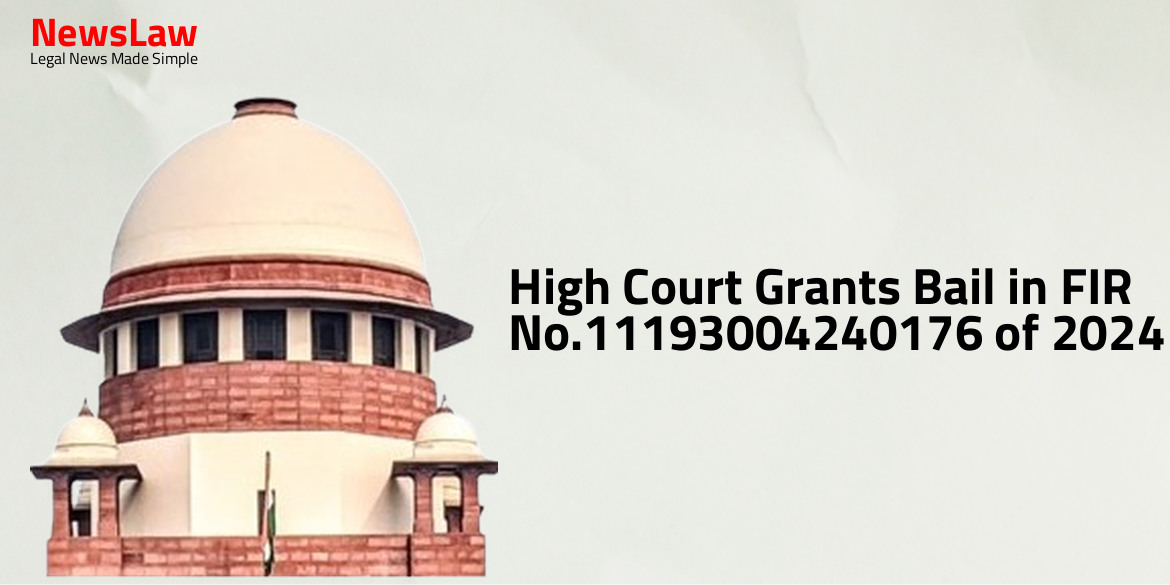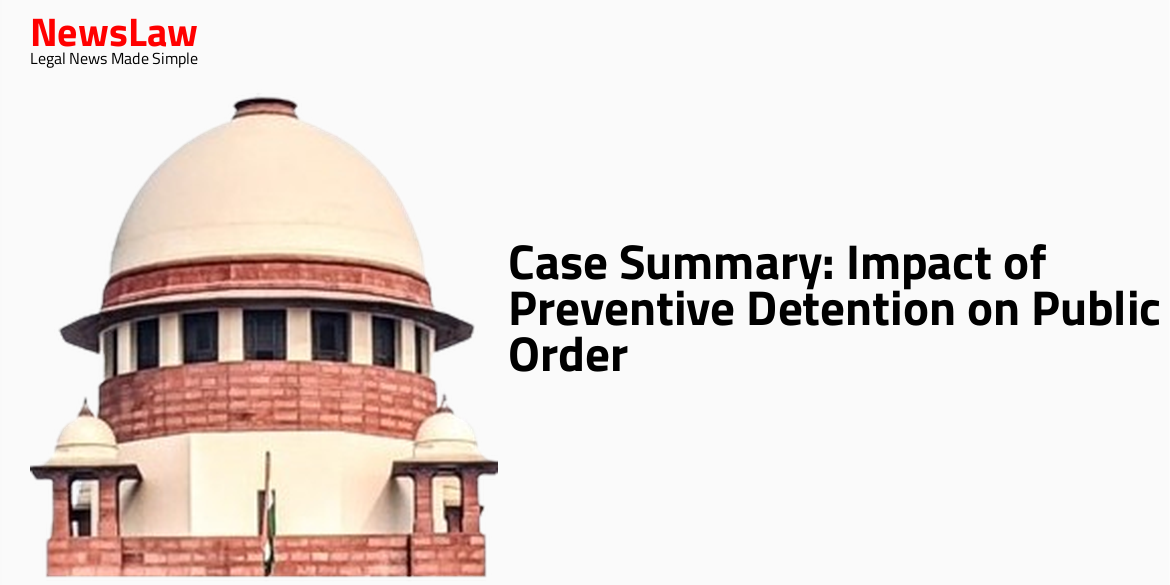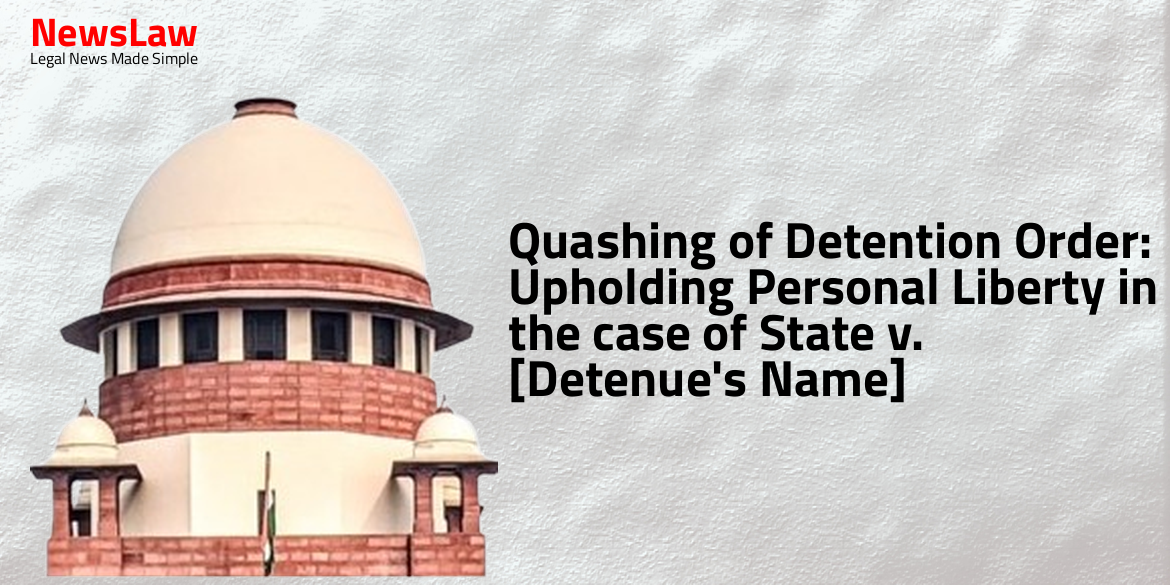In a recent judgment by the Gujarat High Court, a detention order under the Gujarat Prevention of Anti-Social Activities Act, 1985 was quashed. The case involved the detenue challenging the detention order dated 19.01.2024. This decision highlights the significance of legal justice and respect for human rights in the legal system.
Facts
- The present petition challenges the order of detention dated 19.01.2024 passed by the detaining authority under the Gujarat Prevention of Anti-Social Activities Act, 1985.
- The detaining authority exercised powers under Section 3(1) of the Act to detain the petitioner.
- The petitioner is defined as the detenue under Section 2(c) of the Act.
Issue
- The specific issue in this case is whether the decision made by the lower court regarding the interpretation of a particular provision of the Constitution of India is correct.
- The judgment will analyze the arguments presented by both parties in relation to this issue and determine whether there is a substantial question of law involved in this interpretation.
Arguments
- The impugned order of detention is challenged by the petitioner’s advocate
- The detention was based solely on the registration of two FIRs for specific offenses
- The advocate argues that this does not meet the criteria under Section 2(c) of the Act
- The alleged illegal activities do not have a nexus with public order, but rather with law and order
- Lack of relevant and cogent material beyond witness statements and FIR registration to justify detention on grounds of breach of public order
- The AGP supported the detention order passed by the detaining authority.
- Materials and evidences found during investigation indicate detenue’s habit of engaging in activities defined under the Act.
- Detaining authority’s order deemed valid by AGP.
- Detaining authority’s subjective satisfaction found to be illegal and not in accordance with law.
- Offences alleged in the FIRs not considered to impact public order or fall under Section 2(c) of the Act.
- Other relevant penal laws deemed sufficient to address the situation.
- Allegations against the detenue not considered germane to Section 2(c) of the Act.
- A person must pose a real threat to society for detention under Section 2(c) of the Act.
- Detenue’s activities with respect to criminal cases not seen as affecting the social fabric of society.
- Lack of specific material showing detenue’s actions as dangerous to public order.
- Detaining authority did not consider detenue’s release on bail in all offences.
Analysis
- Preventive detention has historical roots from the colonial era with constitutional safeguards.
- Preventive detention is limited in duration and cannot be used for perpetual custody without trial.
- No application for cancellation of bail by State authorities was mentioned in the order.
- Law and order, public order, and security of State are distinct circles with varying impact of acts on each.
- A District Magistrate can intervene to prevent public order subversion but not for maintenance of law and order usually.
- Every breach of the peace does not lead to public disorder.
- The distinction between disturbance to ‘law and order’ and disturbance to ‘public order’ has been settled by a Constitution Bench in the case of Dr. Ram Manohar Lohia vs. State of Bihar.
- The Apex Court emphasized that preventive detention cannot be used as a substitute for ordinary law and must not absolve investigating authorities of their normal functions.
- Preventive detention involves detaining a person without trial to prevent them from committing certain types of offenses, but it cannot replace ordinary law enforcement.
- The freedom of human beings is supreme, and their detention can only be justified if extremely necessary and if their activities affect public order.
- Detentions should be mindful of the characteristics of Articles 21 and 22 of the Constitution of India.
- Not every disorder meets the threshold of disturbance to public order unless it affects the community at large.
- The contravention of any law affects order, but for it to affect public order, it must impact the community or the public at large.
- The personal liberty of an accused cannot be sacrificed for preventive detention, especially when they are already facing criminal proceedings.
- The Constitution Bench held that every disorder does not meet the threshold of disturbance to public order unless it affects the community at large.
- The Apex Court emphasized the importance of exercising caution and proper appreciation of facts before resorting to preventive detention.
- Law and order comprehends disorders of less gravity than those affecting public order.
- Exceptional powers of preventive detention must not devolve into a draconian and arbitrary exercise of state authority.
- Detention orders have been quashed for incorrectly applying the standard for maintenance of public order and relying on stale materials.
- Article 22 must be read as an exception to Article 21.
- Personal liberty protected under Article 21 is of high value in the constitution.
- The detaining authority must show that the detention process follows established law procedures.
- Simply registering FIRs does not necessarily relate to the breach of public order.
- No relevant material existed for invoking the power under Section 3(1) of the Act.
- The petition is allowed, and the detention order dated 19.01.2024 is quashed.
Decision
- Rule made absolute to the extent mentioned
- Petitioner – detenue ordered to be released immediately if not required in any other case
- Direct service permitted, applicable only in rare and exceptional cases
Case Title: SURESHBHAI PUNABHAI MARWADI (SALAAT) Vs. STATE OF GUJARAT
Case Number: R/SCA/3778/2024



